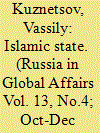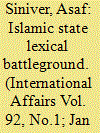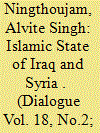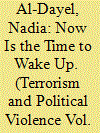| Srl | Item |
| 1 |
ID:
143116


|
|
|
|
|
| Summary/Abstract |
In the last year, an alternative model of statehood for the Middle East region has become a widely discussed topic. While the ideas of various alternative projects appeared quite often in the 20th century (in connection with the establishment of the State of Palestine, the Kurdish problem, the Third International Theory of Muammar Gaddafi, etc.), they occupied a marginal place and hardly ever came close to realization (it will suffice to recall the idea of democratic confederalism by Abdullah Ocalan). However, the rapid strengthening of the Islamic State (IS) and its exoticism seem to create the impression of a sudden emergence of a real alternative.
|
|
|
|
|
|
|
|
|
|
|
|
|
|
|
|
| 2 |
ID:
145265


|
|
|
|
|
| Summary/Abstract |
This article suggests that President Obama's consistent references to the extremist Sunni group as ‘ISIL’ (Islamic State of Iraq and the Levant) is not a trivial matter of nomenclature. Instead, the Obama administration's deliberate usage of the ISIL acronym (as opposed to other commonly-used terms such as ‘Islamic State of Iraq and Syria’ or ‘ISIS’, ‘Islamic State’, ‘IS’, ‘so-called Islamic State’ and ‘Daesh’) frames the public perception of the threat to avoid engagement with the requirements of strategy and operations. Both the labelling and the approach could be defended as a response to the unique challenge of a transnational group claiming religious and political legitimacy. However, we suggest that the labelling is an evasion of the necessary response, reflecting instead a lack of coherence in strategy and operations—in particular after the Islamic State's lightning offensive in Iraq and expansion in Syria in mid-2014. This tension between rhetoric, strategy and operations means that ‘ISIL’ does not provide a stable depiction of the Islamic State. While it may draw upon the post-9/11 depiction of ‘terrorism’, the tag leads to dissonance between official and media representations. The administration's depiction of a considered approach leading to victory has been undermined by the abstraction of ‘ISIL’, which in turn produced strategic ambiguity about the prospect of any political, economic or military challenge to the Islamic State.
|
|
|
|
|
|
|
|
|
|
|
|
|
|
|
|
| 3 |
ID:
157030


|
|
|
| 4 |
ID:
155264


|
|
|
|
|
| Summary/Abstract |
The Islamic State has severe limits and poses a manageable problem. Its limits include that it is unable to occupy ordered areas or Shiite areas. The Islamic State’s military capability and its ability to govern territory are modest. It collaborates poorly with like-minded organizations and it has elicited a military response from countries, reducing its territory and imperiling its existence.
|
|
|
|
|
|
|
|
|
|
|
|
|
|
|
|
| 5 |
ID:
183010


|
|
|
|
|
| Summary/Abstract |
Terrorist organisations are increasingly seeking to attract transnational membership. In particular, the Islamic State proudly displays transnational support in its propaganda. As a result, academics have established that themes of belonging, religious fulfilment, victimhood and utopia are important recruitment devices. This article reveals additional themes that encourage a critical reasoning of the power dynamics in the citizen-state relationship, questioning the strength of religious ideology that is assumed to attract and bind transnational membership. These themes are revealed through an innovative, blended method of critical discourse analysis, interpretivism and securitisation that examines the narratives and influence of the recruitment actor on an international scale. After a review of the Islamic State’s media operations, this method is applied to a prominent video featuring a top recruiter and UN designated terrorist, Australian citizen Neil Christopher Prakash. Then, it details how Prakash’s migration to the Islamic State led to securitisation discourses from both Australia and the U.S., affecting citizen-state relations. It concludes with a discussion on implications, suggesting directions for research on transnational extremist organisations.
|
|
|
|
|
|
|
|
|
|
|
|
|
|
|
|
| 6 |
ID:
169229


|
|
|
|
|
| Summary/Abstract |
This paper develops the notion of ‘Talibanization’ – a concept which stems from the resilience and the determination of the Taliban to remain a dominant player in Afghanistan even after the downfall of their state in 2001. The factors that helped the Taliban to maintain their influence after the disintegration of their state constitute a pattern which could be applied to other conflict-driven areas such as Syria. By critically examining the socio-political conditions in the Syrian district of Jarablus, this paper demonstrates the ways in which the inept post-IS administration is inadvertently helping IS to gain what we call ‘retrospective legitimacy’ a drive which could sustain its influence for many years following its downfall.
|
|
|
|
|
|
|
|
|
|
|
|
|
|
|
|